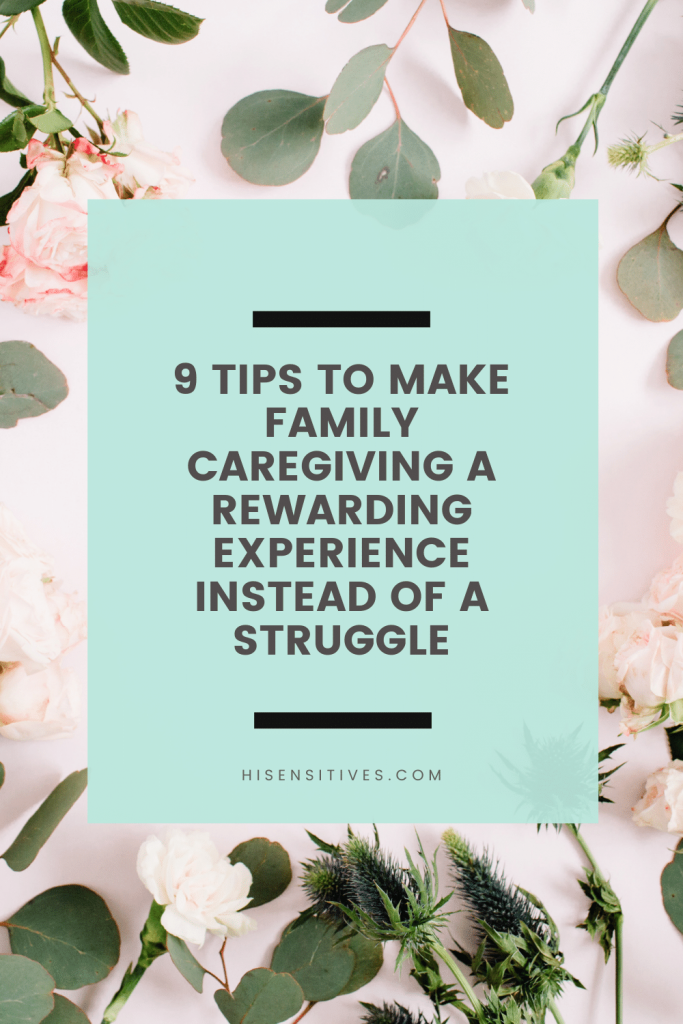In this article, guest writer Andrea Gibbs shares 9 practical tips on how to make family caregiving a rewarding experience.
Estimated reading time: 9 minutes
With medical advancement and healthcare costs on the rise, more and more of ourselves have found caring for our loved ones at home.
Whether you are taking care of a child with a mental or physical illness, a disabled spouse, or an elderly parent, giving care for your loved one is an act of loyalty and kindness.
Day in and day out, you gift your loved ones your genuine care and utmost attention. With this, you improve their life experience even if they cannot express their appreciation.
I know firsthand how challenging taking care of a family member can be; you’re not sure what to expect from them. They can’t tell if they need a drink of water or want your attention. Consequently, at the end of the day, you’re left feeling exhausted like you ran a marathon.
My mother, unfortunately, has been diagnosed with dementia. With that diagnosis comes the knowledge that she will decline day by day.
I’ve seen this happening with my own eyes. I see her struggling with not able to do things she used to before.
There are times that she felt like no purpose at all to stay alive. While it was an unfamiliar experience that felt a little daunting, looking back on it, I feel incredibly grateful for the opportunity to spend time with her and learn from her.
It’s been five years now, and we still talk even though she has difficulty remembering things.
I know for a fact that many of you will go through this journey in the future if you have someone who will need your care.
This article will discuss the things most family caregivers struggle with and the tips to make caregiving a rewarding experience.
Here’s What You’ll Learn
- What Are The Challenges You Face as a Family Caregiver?
- Tips that Can Make Family Caregiving a Rewarding Experience Instead of a Struggle
- #1 Plan Caregivers Time
- #2 Keep in Touch with Friends and Family
- #3 Schedule Grocery Shops in Advance
- #4 Plan Activities and Meetings To Ease Family Caregiving
- #5 Be Prepared for Their Lingering Emotions
- #6 Keep Track of Their Medical Progress
- #7 Give Them a Purpose
- #8 Spend Time with Your Loved One While Family Caregiving
- #9 Find a Balance Between Your Work Within Family Caregiving and Family
- Good Luck On Your Family Caregiving Journey
What Are The Challenges You Face as a Family Caregiver?
Being the primary family caregiver, brings along certain challenges. Below, I summarized some of the most common challenges family caregivers experience.
Emotional and Physical Stress and Exhaustion
You’re a nurse, a cook, and a maid for your loved one all at once. There’s no time to rest when you have to take care of someone else and you don’t know when they need the help.
The stress and exhaustion will be physically felt by your whole body. Especially if there’s someone else you’re caring for on the side, too.
Having a Hard Time Communicating With Them Due to Their Illness
You are bringing up their emotions through complicated conversation. Moreover, they can’t tell if they’re happy or sad, so you have to read their facial expression.
If you’re not used to that, it can be challenging. You also have to watch out for their language. Especially if your loved one has a mental health issue like Alzheimer’s this is the case, because when your loved one gets a word, it sometimes doesn’t make any sense.
Financial Challenges
You’re spending a lot of money on their medical needs, doctors, and supplies. You’re also giving up days off from work to take care of them. Consequently, you don’t have time to search for a second job.
When their medical needs increase, it’s hard for you to manage the cost because you can’t go out and get another job. It’s very tiring.
Not Enough Time
Family caregivers often struggle to find time for themselves which can lead to dissatisfaction in their personal life.
As a result, they feel underappreciated and have trouble communicating with friends and family. Moreover they may attempt to cope by isolating themselves from society for longer periods. This may even end a friendship or romantic relationship due to the stress and inability to spend quality time together.
Having a Hard Time Motivating Yourself
It’s hard to motivate yourself when the person you’re caring for is in a lot of pain. If there is no progress made in this timeframe, it may take some time to motivate yourself again until there’s more progress made.
Tips that Can Make Family Caregiving a Rewarding Experience Instead of a Struggle
Taking care of your loved one is indeed tiring and exhausting. The more time you spend with your loved one, the less time you’ll have for yourself.
As a caregiver, you’re likely losing sleep as well, which can take a toll on your health. For about five years of taking care of my parent, I have found ways to make my caregiving journey more rewarding.
And I also discovered different ways along the way, which help me appreciate more my caregiving journey.
If you’re a caregiver who is looking for tips on how to make family caregiving easier, here are some things that you can do:
#1 Plan Caregivers Time
There will be days when you’re feeling down, and I’ve learned that this is part of being a caregiver. But you have to understand that everybody has their bad days.
So on these days, it’s okay to take a break; make sure you take time out for yourself. It’s the only way your body can recharge your batteries and gain emotional strength. This energy is needed to continue taking care of them again.
#2 Keep in Touch with Friends and Family
It’s okay to spend time away from family members. We all need some alone time to recharge our batteries too. You have to let friends and family members know that you are going through a tough time.
But I’d suggest getting together as often as you can during this time because on days when your family member is feeling down; they need some words of encouragement and love from their loved ones more than ever.
#3 Schedule Grocery Shops in Advance
When you are family caregiving, make sure to schedule grocery shopping in advance. In order to get these things done right away, schedule them in advance. Also, ensure you have the time to do them. You can also buy a few things at the grocery store, including your loved one’s food preferences, and pick up their prescriptions there as well.
If there’s a pharmacy close by that you frequent for your loved one’s prescription, then schedule it ahead of time to avoid disappointment when they don’t have the medicines on hand.
#4 Plan Activities and Meetings To Ease Family Caregiving
When your family member feels down, they need activities to make them feel better. This helps them to forget about their illness for a while.
A lot of times, it’s just what they need to hear. So when you plan activities, make sure you focus on things that will make them smile. Something like a picnic or going to the movies are great ways to spend time with your loved one that will be better than any medicine on Earth!
#5 Be Prepared for Their Lingering Emotions
Few times, I’ve felt so anxious and afraid when my mom was in a lot of pain because I didn’t know how to handle her emotional outbursts that often come with Alzheimer’s disease.
Before I could do anything productive, I would have to calm her down first and assure her that everything would be okay.
#6 Keep Track of Their Medical Progress
The doctor visits and the medicines are not cheap, so make sure you’re keeping track of your loved ones’ medical progress.
There will come a time when they will ask you about your loved one’s medical condition, and if you don’t know much about their illness because you’re trying to catch up on what they’ve been suffering from, it won’t be easy for you to answer them.
So make sure you’re informed enough about their illness so it’ll be easier for you to answer their questions.
Also, keeping track of their daily activities and routines, is a good way to ease your stress and struggles as a family caregiver. This caregiver logbook may help you with that.
#7 Give Them a Purpose
Caring for your loved one can take a toll on you, and they’re likely going through this illness without being able to do anything productive.
However, you can give your loved one a purpose to strive for by asking questions about their job or hobbies when they were younger, like how many animals you had, etc.
I’ve found that this helps them feel better and gives them something different to focus on other than their illness.
#8 Spend Time with Your Loved One While Family Caregiving
I know at first you will have to take care of your loved one 24/7, but once you get comfortable with it, it’s okay to take a break here and there.
But this doesn’t mean you have to spend all your time away from your loved one; you can spend time with your loved one while doing other things like watching television, reading, or playing cards! Just make sure that every time you’re with them, you provide them with comfort and love.

#9 Find a Balance Between Your Work Within Family Caregiving and Family
When you’re a caregiver, finding a balance between work and family can be challenging. Once you start working more, it can be tempting to put all your time and energy into your job, which can be detrimental to the well-being of your loved one.
So always remember that you have a family member at home who needs you just as much as your job does; take time out of work to make sure they are doing okay.
I’ve also learned that dealing with my parent’s illness has become more rewarding when I have some time outside my home, like taking a walk or driving in the country.
Good Luck On Your Family Caregiving Journey
I had a tough time taking care of my mom, but I have learned to appreciate and cherish each moment that comes with it.
You never know when you’ll feel like today may be the last day that you’ll get to talk to them or spend with them, so take advantage of every opportunity. I hope these tips will be helpful in your family caregiving journey too!
If you’d like to receive more tips about family caregiving, make sure to check out the book ‘The 36-Hour Day: A Family Guide to Caring for People Who Have Alzheimer Disease, Other Dementias, and Memory Loss’






